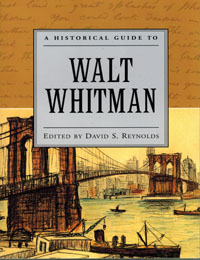A Historical Guide to Walt Whitman
A Historical Guide to Walt Whitman
Edited by David S. Reynolds
New York: Oxford University Press, 1999.

Edited by David Reynolds, this collection of essays by leading Whitman scholars explores Whitman’s dynamic relationship to working-class politics, race and slavery, sexual mores, the visual arts, and the idea of democracy.
“Carries Whitman discourse beyond the commonplace and into the extraordinary.”
–Catherine Kunce, Rocky Mountain Review
About the book
This collection of original essays, edited with a biographical introduction and bibliographical article by David S. Reynolds, presents the insights of leading Whitman scholars into the poet’s dynamic relationship to working-class politics, race and slavery, sexual mores, the visual arts, and the idea of democracy. Included are essays by Ed Folsom (on Whitman and race), Jerome Loving (on the political roots of Leaves of Grass), M. Jimmie Killingsworth (on Whitman and the gay American ethos), Roberta K. Tarbell (on Whitman and the visual arts), and Kenneth Cmiel (on Whitman and democracy).
The poet who emerges from this volume is no “solitary singer,” distanced from his culture, but what he himself called “the age transfigured,” fully enmeshed in his times and addressing issues that are still vital today.
Critical Praise for A Historical Guide to Walt Whitman
“The volume offers a rich fund of source materials and historical contexts…The copious information Reynolds offers in the “Brief Biography” piles one interesting historical fact upon another in a compact narrative of the poet’s life. The chronology, photographs, and bibliographical essays by David Reynolds are useful to even the most experienced scholars.”
–Mark Bauerlin, Walt Whitman Quarterly Review
“The disparate essays edited by David S. Reynolds carries Whitman discourse beyond the commonplace and into the extraordinary. A peculiar virtue of the Guide is that by focusing Whitman through a historical lens, we actually can view panoramically a number of significant contemporary issues such a race, gay ethos, class, and politics.”
–Catherine Kunce, Rocky Mountain Review